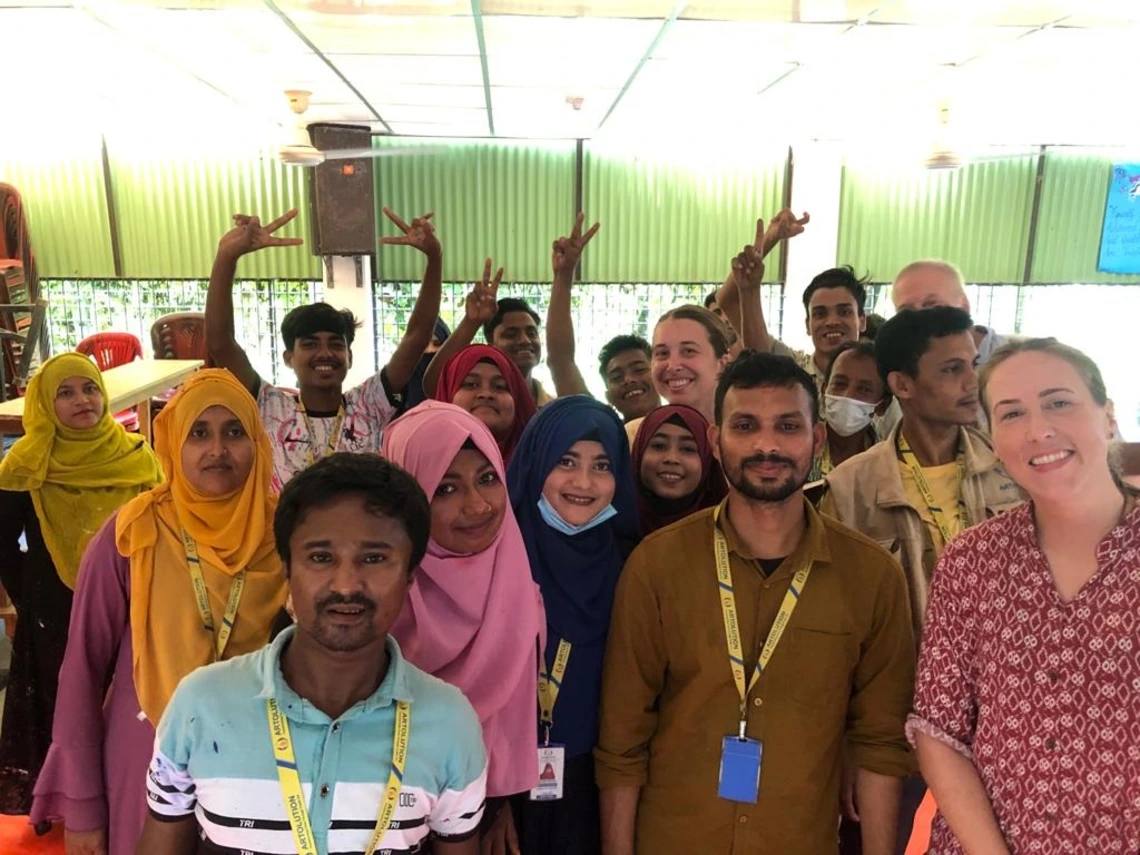Fall update from the Human Rights Practice Program

This summer, three graduate students from the University of Arizona Human Rights Practice Program worked with Rohingya artists and youth at Cox's Bazar Refugee Camp in Bangladesh. The group was led by Professor William Simmons in association with the NGO Artolution and included M.A. students Abby Nelson, McKenna Braaton, and Candice Montano.
Photo courtesy of Candice Montano
Greetings from Tucson! The Human Rights Practice Program is proud to be beginning another academic year at full strength – with our flourishing online MA program, four graduate certificates, and rapidly growing BA major and minor.
There’s been much happening in all of our programs. Here is a sampling of some of the rich learning experiences in which our students have participated both inside and outside the classroom:
- Three of our MA students worked this summer in Bangladesh with Prof. Simmons on a research project with Rohingya adolescent refugees, and an MA and BA student have joined Prof. Brogden on a community-led research project completing a needs assessment to address development barriers and opportunities in the disadvantaged rural areas of northern Ghana, in partnership with an indigenous NGO World Institute of Africa Culture and Traditions. Read more about our work with the Rohingya people. * Read more about our students’ work in Ghana.
- Our BA major and minor has completed its first full year and continues to grow. Undergraduate students have studied issues including reproductive rights, climate change, environmental justice, mass incarceration, health disparities, wealth inequality, LGBTQ rights, and homelessness. Our innovative undergraduate course on “Human Rights Stories” uses journalism, memoir, music videos, poetry, and academic texts to explore the stories of human rights victims, perpetrators and activists. Read more about our undergraduate program.
- We offered a seven-week course starting in mid-May on the human rights crisis caused by the invasion of Ukraine for undergrad and graduate students, in tandem with a very well attended community class. We were fortunate to have Dr. Olena Tanchyk—a 2021-2022 Fulbright Scholar from Mariupol--teach the course along with Dr. Brogden, and it featured 22 video guest speakers who are human rights scholars, genocide researchers, historians and political scientists, and language and culture experts from Ukraine, Russia, Austrian and U.S. universities. The course was also joined by leading human rights activists and NGO leaders from Ukraine and Russia; Ukrainian judges and UN experts on justice and rape as a weapon of war; and journalists and leading Ukrainian music/film artists and directors. We also connected by Zoom with Ukrainian people who were working in a variety of fields when the invasion started and rushed to defend and support Ukraine at the various fronts and in communities where they lived and worked and were under attack. Read more about how our students have responded to the crisis in Ukraine.
- Our students continue to have opportunities to work directly with the UN Special Rapporteur on the Rights of Indigenous Peoples who is in residence at UA’s Indigenous Peoples Law and Policy program at UA’s James E Rogers College of Law: José Francisco Calí Tzay, who is a Mayan Kaqchikel from Guatemala. His impressive background includes 16 years as a member of the UN Committee for the Elimination of Racial Discrimination (serving as President from 2014-2016), Director of Human Rights at the Ministry of Foreign Affairs of Guatemala, a Member of the Presidential Commission Against Discrimination and Racism Against Indigenous Peoples in Guatemala (CODISRA), President of the National Reparation Program for Victims of the Internal Armed Conflict (Guatemala), and Ambassador for Guatemala to Germany. Our program also provided an English Language (ELL) course with graduate students and indigenous women leaders throughout the Americas, and two our MA students received full scholarships to learn a dialect of the Mayan language. Read more about our students’ work with the Special Rapporteur
We look forward to the fall semester, with courses being offered on topics including cultural heritage protection, gender-based violence, femicides/feminicides, documentary media, human rights and trauma, and more.

